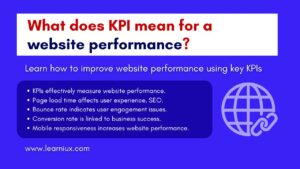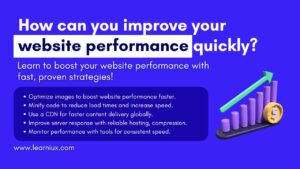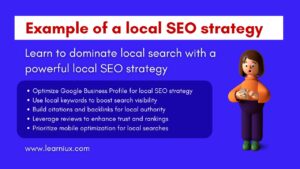Building a strong off-page SEO strategy requires a comprehensive approach that goes beyond the boundaries of your website to increase its authority and credibility in the eyes of search engines. Unlike on-page SEO, which focuses on optimizing the content and technical elements of your site, off-page SEO involves external actions that demonstrate the relevance and credibility of your site. These efforts include acquiring high-quality backlinks, increasing brand mentions, interacting with online communities, and managing local citations. By strategically combining these elements, you can create a strong plan that increases organic traffic and strengthens your online presence. This guide explores practical, actionable steps to building a strong off-page SEO strategy to ensure long-term success in search engine rankings.
Off-page SEO encompasses all activities performed outside of your website to improve its search engine performance. At its core, it revolves around building trust authority and relevance through external signals. Search engines like Google rely on these signals to assess how reputable and valuable your site is compared to others in your niche. A strong off-page SEO strategy acts as a digital endorsement that convinces the algorithm that your content deserves to rank high. This includes not only acquiring links, but also building a positive online reputation through various channels. Understanding the fundamentals of off-page SEO is the first step towards creating a plan that delivers measurable results.
The most important component of a strong off-page SEO strategy is link building. Backlinks from reputable websites act as a vote of confidence to search engines that your content is trustworthy and relevant. However, the focus should be on quality over quantity. A single link from a high-authority site in your industry carries more weight than dozens of links from low-quality or irrelevant sources. To secure valuable backlinks, create content that naturally attracts attention, such as in-depth guides, original research reports, or visually appealing infographics. This asset provides value to your audience and encourages other sites to link to them organically.
Guest posting is another effective link building tactic in a strong off-page SEO strategy. By contributing high-quality articles to authoritative blogs in your niche, you can establish yourself as an industry expert and earn backlinks. Identify websites that match your brand and audience, and then submit unique content ideas that meet the needs of their readers. Make sure your guest posts provide real value, avoid overly promotional content that may be rejected. Including a link to your site in the author bio or, if permitted, in the content itself can increase referral traffic and boost your SEO performance.
Broken link building is a lesser-known but highly effective technique for boosting your strong off-page SEO strategy. This method involves finding broken or outdated links on other websites and suggesting your content instead. Use tools like Ahrefs or Check My Links to identify broken links on related sites, and then contact the site owners and offer your content as an alternative. This approach not only secures valuable backlinks, but also builds relationships with other webmasters that increase the chances of future collaboration. By solving their problems, you increase your chances of getting links.
Beyond link building, brand mentions play a key role in a strong off-page SEO strategy. Unlinked mentions of your brand on social media platforms or forums on other websites also contribute to your online visibility and authority. Search engines interpret these mentions as indicators of your brand’s relevance and credibility. Use tools like Google Alerts or Mentions to track mentions that notify you when your brand name appears online. Responding to these mentions by engaging with the content or thanking the source can increase their impact and encourage further interaction.
Digital public relations is a powerful way to generate brand mentions and strengthen your off-page SEO strategy. By securing features in reputable media outlets, industry publications or popular podcasts, you can expose your brand to a larger audience and gain valuable backlinks. Create compelling press releases or pitch stories that highlight your unique expertise or accomplishments. For example, launching a new product, conducting a groundbreaking study, or hosting a community event can garner media attention. These efforts not only drive traffic but also increase your brand’s credibility in the eyes of both users and search engines.
Social media engagement is another essential pillar of a strong off-page SEO strategy. While social signals like likes, shares, and comments aren’t direct ranking factors, they do increase the reach and impact of your content. A post that goes viral on platforms like Twitter, LinkedIn, or Facebook can drive significant referral traffic to your site and increase your chances of gaining backlinks. Develop a content distribution plan that aligns with your target audience’s preferences to maximize social media impact. Share blog posts, video infographics, or interactive content that encourages engagement and sharing.
Collaborating with influencers can further enhance your strong off-page SEO strategy by tapping into their established audiences. Identify influencers in your niche whose followings align with your target demographic, and then propose partnerships like co-created content, sponsored posts, or product reviews. These collaborations can generate buzz, attract backlinks, and increase your brand’s visibility. Track engagement metrics like shares, clicks, and referral traffic to measure the success of your influencer campaigns and improve your approach over time.
Participating in online communities and forums is another way to build a strong off-page SEO strategy. Platforms like Quora, Reddit, and industry-specific forums allow you to share expertise and establish your brand as a thought leader. Contributing to these platforms provides valuable insight and avoids overt self-promotion. Including a link to your website in your profile or related responses can increase traffic and improve your SEO performance. Consistent participation builds trust and increases the likelihood of getting mentions or backlinks from community members.
Local SEO is an important aspect of a strong off-page SEO strategy for businesses with a physical presence. Optimizing your Google Business Profile ensures that your business appears in local search results and map listings. Keep your profile updated with accurate information like your address, phone number, and business hours. Encourage satisfied customers to leave positive reviews as these build your credibility and influence local rankings. Responding promptly to positive or negative reviews shows your commitment to customer satisfaction and strengthens your online reputation.
Citations are another important component of a strong off-page SEO strategy. Citations are mentions of your business name, address, and phone number on directories like Yelp Yellow Pages or industry-specific platforms. Consistency is key. Make sure your information is consistent across all listings so that search engines or users don’t get confused. Use tools like Moz Local or BrightLocal to manage citations and fix any inconsistencies. Building a strong citation profile improves your visibility in local searches and increases the number of people coming to your business.
Measuring the success of your strong off-page SEO strategy is essential for long-term improvements. Use tools like Google Analytics Ahrefs or SEMrush to track key performance indicators such as backlink growth, domain authority, referral traffic, and organic search visibility. Set clear benchmarks for these metrics and monitor them regularly to assess your progress. For example, an increase in high-quality backlinks or an increase in domain authority indicates that your efforts are succeeding. Conversely, a decrease in referral traffic may indicate that your strategy needs to be adjusted.
Conducting regular audits is an important part of maintaining a strong off-page SEO strategy. Audits help you identify toxic or low-quality backlinks that could be hurting your rankings. Use tools to disavow harmful links and focus on acquiring links from reputable sources. Additionally, review your brand mentions and social media engagement to ensure they align with your SEO goals. By being proactive, you can address issues before they impact your performance and find new opportunities for growth.
It’s crucial to avoid common mistakes when building a strong off-page SEO strategy. One of the biggest mistakes is buying links or participating in link farms, as these practices violate search engine guidelines and can lead to penalties. Focus on gaining links naturally through high-quality content and genuine relationships. Another mistake to avoid is over-optimizing anchor text, as it can come across as manipulative to search engines. Instead, create a diverse anchor text profile that reflects natural linking patterns.
Neglecting mobile optimization can also weaken your strong off-page SEO strategy. Most searches are now done on mobile devices, so it’s essential to ensure a consistent user experience across all platforms. Links and mentions will have little impact if visitors encounter a poorly designed or slow-loading mobile site. Test regularly to ensure your website meets mobile usability standards and aligns with your off-page efforts.
Another mistake is ignoring user experience signals in your off-page SEO strategy. While off-page SEO focuses on external factors, it should complement your on-page efforts. For example, backlinks that drive traffic to a site with poor navigation or irrelevant content will result in high bounce rates, which will reduce their value. To maximize the benefits of your off-page work, make sure your website offers a positive user experience with fast load times, clear navigation, and valuable content.
Consistency is key to maintaining a strong off-page SEO strategy. Building authority and trust takes time, and sporadic efforts are unlikely to yield significant results. Develop a long-term plan with clear goals, such as acquiring a certain number of backlinks or increasing social media engagement by a certain percentage. Schedule regular tasks like content creation outreach and citation management to maintain momentum. By staying disciplined, you can achieve steady progress and avoid fluctuations in your SEO performance.
Experimentation is also key to a strong off-page SEO strategy. Search engine algorithms are constantly evolving, and what works today may be less effective tomorrow. Test new tactics, such as collaborating with emerging influencers or exploring specific forums, to stay ahead of the curve. Analyze the results of your experiments to determine which strategies are yielding the best return on investment. This iterative approach allows you to adapt to changes in the SEO landscape and maintain a competitive edge.
At the heart of a strong off-page SEO strategy is building relationships. Guest posting enhances your efforts through influencer collaborations or community engagement that fosters genuine connections with others in your industry. These relationships can lead to organic backlink mentions and partnerships that increase your brand’s authority. Instead of focusing on what you can get, try to reach out authentically by providing value to your partners.
Once your strong off-page SEO strategy gains momentum, the next step is to scale up your efforts. Once you’ve built a strong foundation of backlink mentions and social engagement, expand your reach by targeting larger publications or broader audiences. For example, pitch to national media outlets or collaborate with influencers with global followings. Scaling requires balancing ambition and quality to ensure your efforts align with your brand values and SEO goals.
A strong off-page SEO strategy also benefits from competitor analysis. Study your top competitors’ backlink profiles, social media strategies, and brand mentions to identify gaps and opportunities. Tools like Ahrefs or SpyFu can reveal where competitors are getting links or visibility. Use this data to refine your approach to targeting similar or unused sources to strengthen your own strategy. Staying informed about industry trends and competitor strategies keeps your efforts relevant and effective.
Including video content can further enhance your strong off-page SEO strategy. Videos are highly shareable and can attract backlinks, mentions, and social engagement. Create tutorials, product demos, or behind-the-scenes content that your audience will love. Share these videos on platforms like YouTube, Vimeo, and social media, embedding links back to your website. Optimize video title descriptions and tags with relevant keywords to improve searchability and drive traffic.
Engaging with user-generated content is another way to strengthen your strong off-page SEO strategy. Encourage customers to share reviews, testimonials, or social media posts about your brand. Run campaigns like hashtag challenges or contests to encourage participation. This content not only increases your brand’s visibility, but also builds a sense of community and trust. Highlight user-generated content on your website or social channels to increase its impact and encourage further contributions.
Monitoring algorithm updates is important to maintaining a strong off-page SEO strategy. Search engines frequently revise their ranking criteria, and staying informed ensures that your strategies remain effective. Follow industry blogs like Search Engine Journal or Moz to stay up to date on changes. Adjust your strategy as needed, for example prioritizing content quality over link volume if the algorithm shifts toward user intent. Proactive adaptation keeps your SEO efforts aligned with current best practices.
Ultimately, a strong off-page SEO strategy is about building a sustainable digital presence that is both search engine and user-friendly. By focusing on high-quality backlinks, authentic brand mentions, active social media engagement, and consistent local citations, you build the foundation for long-term success. Track your progress, avoid common pitfalls, and adapt to changes in the SEO landscape. With patience and persistence, your efforts will translate into improved rankings, increased traffic, and a stronger online reputation.





















































